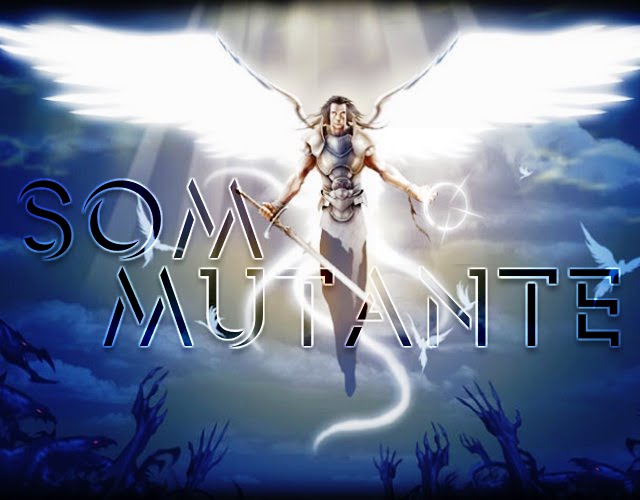“Isolation remains today as one of the most unknown folk-psych groups of the UK.” it says. "Released in micro-quantity back in 1973" and “Reminiscent of folk-psych legends Ithaca. This is an album you’d better own!!” Hoho not too quickly ! Let me hear it first. I can’t recognise any Ithaca, except for the use of the same instruments, and some improvisation. The (not so fantastic) singing reminds me partly more of American CSNY-influenced bands. And the recording itself has so much noise reduction, the remaining music sound like it's being sandwiched. The improvisations of acoustic guitars with piano and flute are good, sometimes a bit jazzy psych-folk styled. The whole idea reminds me more of the first reissue of Oberon. The music is fine, but not fantastic. But the “remastering” could have been better.
9 de dez. de 2015
6 de dez. de 2015
Keith Christmas - Folk Rock
Keith Christmas (born Keith Peter Christmas, 13 October 1946, Wivenhoe, near Colchester, Essex) is an English singer and songwriter. In 1969 his first album Stimulus was released. Christmas played acoustic guitar on David Bowie's Space Oddity album, and appeared at the first Glastonbury Festival in 1970. Through the 1970s he released four more albums, Fable Of The Wings, Pigmy, Brighter Day and Stories From The Human Zoo, while touring with and supporting bands like The Who, King Crimson, Ten Years After, Frank Zappa, Roxy Music, Hawkwind, Captain Beefheart and The Kinks. Among the musicians who contributed to his recordings were Mighty Baby, Pat Donaldson, Keith Tippett, Gerry Conway, Shelagh McDonald, Rod Argent, Peter Sinfield, Greg Lake, Mel Collins, Cat Stevens and Michael Boshears. In 1972 he was voted one of six favourite international artists by writers of Sounds magazine.
In 1976 he came back to England and after a few years stopped playing. He formed the blues band 'Weatherman' in 1991 with some friends and an album of the same name was released in 1992. In 1996 he suddenly started to write a different kind of acoustic material which almost immediately led to the release of a new album 'Love Beyond Deals' on HTD records. In January 2003 Keith released an instrumental CD, ‘Acoustica’. It got excellent worldwide reviews - ‘absolutely brilliant’, ‘this is a quite exceptional piece of work’, ‘lavish and overwhelming’, ‘a beautiful album’, and the opening track was used on the BBC documentary 'Hidden Gardens'. In 2006 he recorded and produced his first ever solo CD called 'Light of the Dawn'. The magazine fRoots reviewed it “…the sound is fantastic and grabs the attention: the confident, gutsy guitar, picked or slide, has immediacy and intimacy in equal measure; and Christmas's urgent, hoarse vocals can't help but involve the listener in the moods and stories of the songs…a fine timeless album” In 2011 Keith released a 5-track solo acoustic EP called 'Fat Cat Big Fish' and in 2012 released his first live CD 'Live at the Pump'
Personnel:
- Keith Christmas - vocals, guitar
- Jan Whiteman - piano, electric piano, organ, mellotron
- Keith Tippett - piano
- Mike Evans, Pat Donaldson - bass
- Gerry Conway, Roger Powell - drums
- Bob Stewart - autoharp
- Shelagh McDonald - vocals (02)
- Sandy Roberton - producer
3 de dez. de 2015
Pazop - 70's Beligium Prog Rock
Pazop were an early-'70s progressive rock group with some jazz-fusion tendencies from Belgium. Though their music was beyond the ordinary, they were never able to release an album during their short lifetime. Pazop was formed at the end of 1971 by vocalist and flautist Dirk Bogaert, keyboardist Frank Wuyts, violinist Kuba Szczepansky, bassist Patrick Cogneaux, and drummer Jacky Mauer. Wuyts and Szczepanski had just left progressive rock band Wallace Collection, Wuyts had previously been involved with Bogaert, Cogneaux, and Mauer had been in another short-lived prog band, Waterloo. Cogneaux had also been a member of Arkham, a group that included future members of Magma and Univers Zero, while Sczcepansky, a classically trained musician born in Poland, played in the Brussels Opera Philharmonic Orchestra for a couple years before turning to rock with Wallace Collection in 1970. Even before they had decided on a name, the new group approached Wallace Collection's label, EMI, and though the record company did not sign the group, they offered them a two-day studio session to record a better demo. The four-song demo was in a style far more commercial than their normal sound, which had influences as diverse as Miles Davis, 20th century classical music, progressive rock groups like King Crimson and Caravan, and Frank Zappa. With the new demo Szczepanski and Mauer headed to Paris to hit up every record label there for a contract, but they had no success. They also finally came up with a name for themselves, Pas Op, Flemish for "Warning" but the spelling was soon changed to Pazop.
Psychillis of a Lunatic Genius They finally got a contract with producer Luigi Oglival in March of 1972, who was able to get them signed to CBS and the Barclay label. The band went into the Herouville Studio in France in July 1972 to record the album Psychillis of a Lunatic Genius. The group also played several gigs at the Gibus-Club in Paris, which brought them some excellent press, as well as other shows in France and Belgium. Meanwhile, near the end of that year, Barclay rejected their album as being too non-commercial, and chose to release one of the earlier demos as a single instead, much to the group's chagrin. Oglival, who realized he wouldn't recoup the studio costs, dropped the band as well, reneging on his contract and even keeping the master tapes. In 1973, the group was hired by pop musician Sylvain Van Holme to provide modern rock adaptations of various classical pieces by Tchaikovsky, Dvorák, Mozart and Verdi. Van Holme decided to co-produce a new record by Pazop, and booked them at the Start Studio in Belgium in the late summer of 1973. Van Holme contacted several record companies, but again the album was not commercial enough. The group continued touring Belgium and France until July of 1974 before calling it quits. Their inability to get enough gigs and to release either of their LPs had left them financially and emotionally strapped, and they split up for more successful groups. Their master tapes sat in a desk drawer for years. Pazop's two albums, minus the four commercial demos, were finally released on CD by Musea in 1996. (http://www.allmusic.com/artist/pazop-mn0001976155/biography).
30 de nov. de 2015
Pepper Tree - Canada Rock
Comprised of Chris Brockway,Jim White,Bob Quinn and Tim Garagon,Pepper Tree was signed by Capitol in 1970.You're My People (1971) featured the Canadian hit "Mr. Pride." Several singles followed in the early '70s,but Pepper Tree never duplicated their early success.Pepper Tree hailed from Nova Scotia and was formed in 1967.After a few years of saturating the club scene in Canada,the band finally landed a contract with Capitol Records in 1969.Producer,Jack Richardson,was drafted to produce a single which saw the band charting in their native country.Lineup changes ensued over the next year,until "You're My People" hit store shelves in 1971.The album was a solid mix of folk,pop,prog and organ driven hard rock.By 1973,the band was belly up and members went on to such bands as Rhinegold, Molly Oliver,Hanover Fist,Wrabit,Lee Aaron,Chilliwack and Headpins.Many of them are still active in both performing and producing music.
27 de nov. de 2015
Kieran White from Steamhammer
Kieran Raymond White (died March 1995, Oregon, USA) was an English baritone vocalist. and guitarist. He sang and played in the blues-rock band Steamhammer, formed in 1968. Their debut album, Steamhammer. was released in 1969 - on which he co-wrote many of the songs and played harmonica. White left the band in 1971 and recorded a solo album, Open Door (released in 1975) - he also worked for Gull Records as a staff songwriter, and later sang for the jazz-rock band Nucleus. After this period, he emigrated to the United States and became a truck driver, settling in Oregon. He died in 1995 from cancer.
23 de nov. de 2015
Supermax - Funky Dance Music
Um sonzinho diferente aqui no Som Mutante. Um Funky Dance muito bem tocado da Áustria...
In 1977, Kurt Hauenstein, multi–instrumentalist and forward thinking musician founds SUPERMAX in the city of Frankfurt am Rhein, and he releases his first Album "Don't stop the music". After his first tour through Germany’s biggest concert venues, SUPERMAX changes gear into the club-scene and introduces his exocentric, monotone (aficionados will know…) and smooth sound to a new flair oriented towards the European and American Underground-scene. The second album "World of today" yields a barn-burner hit after eleven months. SUPERMAX breaks all sales records and becomes "Best selling Artist" of WEA-Records. SUPERMAX receives its first Golden album, including the "Golden Aphax-Tape" award. Over 160 feverish concerts were played in Germany, Switzerland, Italy, Holland, Belgium and Spain. Born from this album was and still is the ambient disco-hit "Lovemachine", which excels SUPERMAX into galaxies of ephemeral disco heaven. Towards the end of 1978, Kurt Hauenstein leaves the European mainland to seek new inputs in the Caribbean Islands. (http://www.supermax.cc/history.html)
Backing Vocals – Juanita Schulz
Drums – Hartmut Pfannmüller
Drums, Percussion, Backing Vocals – Brad Howell
Engineer – Fred Schreier, Jochen Wenke
Engineer [Assistant] – Armin Bannach
Lead Guitar, Rhythm Guitar, Backing Vocals – Rainer Marz
Lead Vocals, Bass, Organ, Synthesizer [Moog], Percussion, Backing Vocals, Strings [String Ensemble] – Kurt Hauenstein
Mastered By – Chris Brüggemann
Percussion – Daniel Ford, Jürgen Zöller, Peter Koch
Producer – Peter Hauke
Synthesizer [Moog], Piano [Fender Rhodes, Grand], Organ [Hammond], Keyboards [Hohner D6], Strings [String Ensemble], Backing Vocals – Richard Schoenherz*
Vocals – Cynthia Arrich, Tebles Reynolds*
19 de nov. de 2015
Spiders From Mars
The Spiders from Mars group had its origins in Bowie's earlier backing outfit The Hype, which featured Ronson and Woodmansey, but Tony Visconti on bass. They were briefly signed as a band on its own, known as Ronno. With Bolder taking over bass, they were subsequently named via the landmark 1972 Bowie concept album The Rise and Fall of Ziggy Stardust and the Spiders from Mars and were billed as such on the accompanying large-scale Ziggy Stardust Tour. They were present again on Bowie's 1973 album Aladdin Sane. Another leg of the tour followed that year, with the final show captured in the film Ziggy Stardust and the Spiders from Mars. The group joined Bowie in the theatrical style of the material's presentation. Ronson's guitar and arranging during the Spiders from Mars era not only fit into this style, but also provided much of the underpinning for later punk rock musicians. In 1975 Bolder and Woodmansey reformed the band without Ronson, and were joined in this lineup by Mike Garson, Dave Black, Pete McDonald. Their self-titled album, released in 1976, was their only album before the group disbanded. The name came from the famous UFO sighting where a stadium crowd thought they had witnessed Martian spacecraft which turned out to be migrating spiders and not from the Martian areographic features often labelled as 'spiders' and 'baby spiders.' In 1976 the Spiders From Mars album was released. In 1975 the Spiders From Mars had been reformed by Trevor Bolder and Woody Woodmansey but without Mick Ronson and with no contribution or connection to David Bowie.
Assinar:
Postagens (Atom)



































































.jpg)


